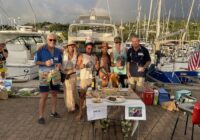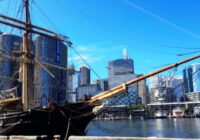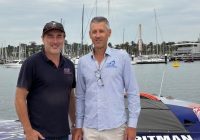Article by Dr Jouko Huju
Benefits of Serving on an Exhibition Committee for Industry Members
While the marine industry is known for its collaborative spirit, finding motivated and qualified individuals to contribute to broader initiatives like boat shows can be challenging. Most marine companies are SMEs with limited resources, especially time. As the industry’s challenges grow more complex, there is an increasing need for versatile, highly motivated individuals willing to give back and serve in key roles.

Serving on an exhibition committee comes with responsibility, not power. The committee ensures that the boat show aligns with its mission and performs effectively. Members must look beyond their company’s interests and consider the industry as a whole. Serving on the committee can be a way to influence the future of both the industry and one’s own business, aligning individual interests with the collective goals of the exhibition.
Many join a committee because they believe in the mission of the event. It’s important to keep members informed about new developments and demonstrate the impact of the show’s efforts. In the marine industry, participation tends to be driven by practicality rather than passion.
Committee service is often seen as rewarding and offers the chance to learn new skills, network with like-minded professionals, and make a meaningful contribution. However, burnout and lack of clear direction can lead to disengagement. It’s vital to create an environment that fosters motivation and accountability among committee members.
Bringing in Fresh Perspectives
Rotating committee members is crucial to introduce new ideas and perspectives. While fresh blood brings innovation, the limited pool of qualified individuals in the marine industry can pose a challenge. Without rotation, the committee can become stagnant, leading to a lack of creativity and innovation. It’s important to have a system for evaluating member performance and making recommendations for future service.
An effective recruitment and nomination process may include:
- Establishing a committee development group
- Actively recruiting new members
- Developing a profile of the current committee
- Identifying strategies to increase diversity
- Compiling a list of potential members
- Conducting orientation sessions for prospects
- Selecting new committee members
Providing new members with the right tools and training from the start is essential for success.
Communication and Collaboration
Open, constructive dialogue between committee members and the Exhibition Director is crucial. Committees that work well foster critical discussions, which is the hallmark of an effective team. To maintain productivity, the committee must communicate regularly between meetings. A smaller executive committee can streamline decision-making and ensure ongoing effectiveness.
Regular meetings of the executive committee between the full exhibition committee meetings can keep progress on track. This group can handle tasks that require more immediate attention and set the agenda for larger committee discussions.
Motivating Committee Members
Committee members need to be motivated by a sense of responsibility rather than authority. Aligning the interests and expectations of committee members with the event’s goals is key to maintaining engagement. Recognising contributions, offering opportunities for skill development, and conducting regular evaluations can foster commitment.
A well-structured and adequately sized committee is crucial to balance workload and bring in diverse viewpoints. The executive committee, consisting of key members, plays a vital role in decision-making and communication, ensuring the exhibition committee functions effectively.
Ultimately, the question remains: Is your organisation ready to invest the time and resources needed for this vital work? The answer should be a resounding yes.
Dr Jouko Huju
Jouko has worked all his career in export promotion and international trade, both in private and public sectors. He served at FINNBOAT (Finnish Marine Industries Federation) for over 20 years in various capacities including that of CEO and later, as Chairman.

His passion for industry development, exports and international relations led him to ICOMIA (International Council of Marine Industry Associations) where he was a board member for 14 years. He was actively involved in the establishment of European Boating Industry (EBI) and the KV- Foorum, a public- private partnership to foster dialogue and promote cooperation in the export sector. He has served as Board member and Chairman of numerous organisations including, but not limited to ICOMIA, IMCI, FINNBOAT and KV-Foorum.
He believes in both work-based-learning and lifelong-learning, completing an English MBA program and straight after that also a DrBA program. After 6 years of studying alongside work he wrote a thesis on: “Navigating New routes to Lobbying in Brussels – A Research on European Boating Industry”
Jouko is fluent in Finnish, Swedish, English and German.
Jouko is based in Finland. Those wishing to contact Jouko can do so on +358 40 5509310 or email at
Those wishing to contact GMBA in Australia can do so through MaryAnne Edwards or call +61 412 916 036
Global Marine Business Advisors and its associated website www.gmba.blue are not registered legal entities. GMBA is a network of independent marine industry advisors.







